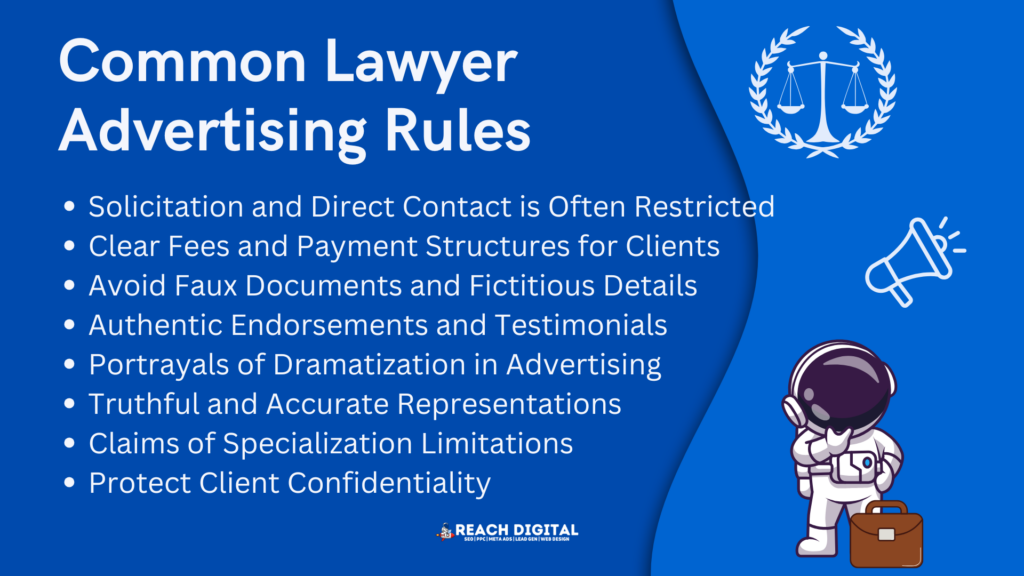Finding the right lawyer can be a challenging experience for anyone facing a legal issue. People rely heavily on online resources to research and select an attorney. In fact, research indicates that 74% of people looking for an attorney visit a law firm’s website. This highlights how crucial lawyer advertising is for any successful practice.
However, it’s a balancing act. Attorneys must market their services effectively while staying within the bounds of ethical rules and regulations. Failing to comply with legal advertising rules can result in serious consequences, from disciplinary action to damage to your reputation. This blog post will guide you through the essential rules and best practices for lawyer advertising. It will help you build a strong online presence while maintaining ethical standards.
Common Lawyer Advertising Rules
This section covers common lawyer advertising rules that govern how attorneys can promote their services.
Truthful and Accurate Representations
The foundation of ethical lawyer advertising rests on honesty and accuracy. Model Rule 7.1 of the ABA Model Rules of Professional Conduct states that lawyers cannot make false or misleading statements. This includes any communication about the lawyer or their services.
What constitutes a misleading statement?
- Guaranteeing results: It’s unethical to guarantee a specific outcome for a case. For example, claiming “I win every case” creates unrealistic expectations.
- Exaggerating experience or qualifications: Lawyers must accurately represent their experience and expertise.
- Misrepresenting connections or affiliations: Any association with organizations or institutions must be truthful and not imply an unheld status.
- Failing to disclose paid advertising: Consumers have a right to know if a particular content is an advertisement or an organic endorsement.
Claims of Specialization
Be cautious about claiming specialization in a particular area of law. Model Rule 7.4 addresses communications about specialization and the limitations on claiming it. While you can highlight your experience and focus in a specific practice area, you generally cannot claim to be a “specialist” or “expert” unless you are certified by a recognized organization approved by your state bar.
For example, stating, “I specialize in personal injury law” may be misleading unless you hold a valid certification in that field. Instead, you might say, “I focus my practice on representing clients in personal injury cases.”
Confidentiality
Protecting client confidentiality is a cornerstone of legal ethics. This duty extends to advertising materials. Rule 1.6 of the ABA Model Rules addresses Confidentiality of Information. Lawyers must obtain informed consent from clients before using their information in advertising.
Examples of confidentiality breaches in advertising include:
- Using client testimonials without explicit permission.
- Disclosing specific details about a client’s case without consent.
- Using recognizable images of clients without their approval.
Solicitation and Direct Contact
Direct solicitation of potential clients is often restricted. Model Rule 7.3 provides guidance on solicitation and contacting potential clients directly. This includes in-person solicitation, unsolicited emails, and phone calls, particularly when targeting vulnerable individuals.
However, there are exceptions:
- Contacting potential clients with whom you have a prior professional or personal relationship.
- Responding to requests for information.
- Communicating with individuals who have indicated they want to be contacted.

Fees and Payment Structures
Transparency is a must when it comes to legal fees. Model Rule 1.5 requires lawyers to communicate their fee arrangements clearly to clients. Misleading fee structures or hidden costs are prohibited.
Key Considerations for Advertising Legal Fees:
- Clearly state your fee structure (e.g., hourly rates, contingency fees, flat fees).
- Avoid using unclear language or creating unrealistic expectations about costs.
- If offering free consultations, specify the scope and limitations.
Endorsements and Testimonials
Using endorsements and testimonials can be an effective lawyer advertising tool, but they must be handled ethically.
- Disclosure: Lawyers must disclose any connection to the person providing the endorsement, including payment or other incentives.
- Authenticity: Testimonials must reflect genuine client experiences and cannot be fabricated or misleading.
Portrayals of Dramatization in Advertising
Many states have rules regarding the use of actors, dramatizations, or simulations in attorney advertising. These portrayals must not mislead viewers about what you offer or create unjustified expectations about the legal process.
For instance, if you use actors in a video advertisement, it’s often necessary to include a clear disclaimer that the individuals are not actual clients. Some states may even prohibit certain types of dramatizations altogether, especially those that might be considered undignified or exploitative.
It’s important to consult your state bar association for specific guidelines on portrayals and dramatizations in advertising for attorneys. To avoid uncertainty, you can submit your television or radio ads to your state bar association for review. They will either provide you with approval or deny your ad, offering valuable guidance on compliance.
Information that Can and Can’t Be Included in Advertisements
Lawyer advertising rules often involve specific requirements for what information must be included in your ads, as well as restrictions on certain content. Familiarity with these rules is essential to maintaining compliance and avoiding ethical violations.
Information You May Be Able to Include:
- Identifying Details: Some jurisdictions require specific identifying information in lawyer advertisements. For instance, Florida Bar Rule 4-7.12(a)(1) mandates that ads must include the name of at least one lawyer or the law firm’s name. Similarly, New York has rules requiring certain ads to be labeled “Attorney Advertising.”
- Publications and Awards: You may be allowed to mention publications or accolades received from law-related or legal industry organizations.
- Memberships: You can typically list your current memberships in bar associations or other relevant professional organizations.
Information That May Not Be Allowed
- Pending Case Information: Rule 7.1 of the New York Rules of Professional Conduct prohibits including testimonials from clients with pending matters unless you have obtained informed client consent in writing. This is crucial to protect client confidentiality and avoid creating misleading impressions.
- Fictitious Details: Using made-up law firms, lawyer names, or other fictitious details in your advertising is also prohibited under Rule 7.1 of the New York Rules of Professional Conduct. Advertisements must be grounded in truth and accuracy.
- Faux Documents: Never include fake legal documents or fabricated case results in your lawyer advertising. This can mislead potential clients and undermine the integrity of the legal profession.
Remember that lawyer advertising rules vary by jurisdiction, so it’s crucial to consult your state bar association for detailed guidance on what information can and cannot be included in your advertisements.
Digital Marketing and Lawyer Advertising

The rules governing attorney advertising extend to the digital domain, impacting how attorneys use online platforms to reach potential clients. Websites, social media, search engine optimization (SEO), and online advertising all fall under the scope of these regulations.
Key Considerations for Lawyer Digital Marketing
- Website Content: Your website must adhere to the same truthfulness and accuracy standards as traditional advertising. Avoid misleading claims, ensure client confidentiality, and clearly disclose fee information.
- Lawyer SEO: While lawyer SEO is crucial for online visibility, avoid unethical practices like keyword stuffing or creating misleading content to manipulate search rankings. Focus on providing valuable, informative content that genuinely helps potential clients.
- Social Media: Social media posts and interactions should maintain professionalism and comply with advertising rules. Be mindful of confidentiality, endorsements, and appropriate solicitation.
- Google Ads: When using Google Ads, ensure your ad copy and landing pages align with ethical guidelines. Avoid misleading language, unsubstantiated comparisons, and improper use of keywords.
Working with a Law Firm Digital Marketing Agency
Partnering with a reputable law firm digital marketing agency can be invaluable. An experienced agency can help you navigate the complexities of online advertising while ensuring compliance with ethical rules. They can assist with:
- Developing a comprehensive digital marketing strategy.
- Creating compliant and engaging website content.
- Implementing SEO strategies that prioritize valuable content and user experience.
- Managing social media presence and online reputation.
- Running effective and ethical Google Ads campaigns.
It’s crucial to understand how legal advertising rules apply to digital marketing. By working with knowledgeable professionals, you can leverage online marketing to reach potential clients. A strong digital presence can help you grow your practice while upholding the highest ethical standards.
Best Practices for Ethical and Effective Lawyer Advertising

Creating effective lawyer advertising involves more than just following the rules; it requires a strategic and ethical approach. Let us summarize the best practices to ensure your advertising is both successful and compliant:
Prioritize Client Needs
Focus on providing valuable information that addresses potential clients’ concerns and helps them understand their legal options. Avoid overly aggressive or salesy language.
Use Clear and Concise Language
Legal issues can be complex. Use straightforward language that is easy for the average person to understand. Avoid jargon or technical terms that might confuse potential clients.
Be Transparent About Fees
Clearly communicate your fee structure and avoid any hidden costs. Transparency builds trust and helps potential clients make informed decisions.
Maintain a Professional Tone
Your advertising should reflect the professionalism and integrity of the legal profession. Avoid using humor or tactics that might be perceived as undignified or exploitative.
Focus on Your Strengths
Highlight your experience, expertise, and unique qualities that set you apart. However, avoid unsubstantiated comparisons to other lawyers or misleading claims of specialization.
Use Client Testimonials Carefully
If you use client testimonials, obtain informed consent and ensure they accurately reflect client experiences. Avoid testimonials that may create unrealistic expectations.
Stay Updated on Legal Advertising Rules
Rules and regulations are subject to change. Stay informed about the latest guidelines and best practices regarding advertising for attorneys in your jurisdiction.
Monitor and Review Your Advertising
Regularly review your advertising materials to ensure they remain compliant and effective. Be prepared to make adjustments as needed.
Consider Hiring a Professional
Working with a reputable digital marketing agency can provide valuable expertise and help you navigate the complexities of legal advertising rules.
As an attorney, you can create effective lawyer advertising campaigns that attract clients while upholding ethical standards. This approach maintains the integrity of your practice. Keep in mind that unethical lawyer ads not only damage your reputation but can also lead to disciplinary action. Always prioritize compliance with legal advertising rules to build a sustainable and successful law practice.
Take Your Lawyer Advertising to the Next Level
Lawyer advertising is a crucial aspect of building a successful law firm. Attorneys must strike a balance between promoting their services and upholding ethical standards and rules.
If you need assistance developing an effective and ethical lawyer advertising strategy, our team is here to help. We specialize in helping law firms achieve their marketing goals while maintaining compliance with all relevant regulations. Contact us today!





